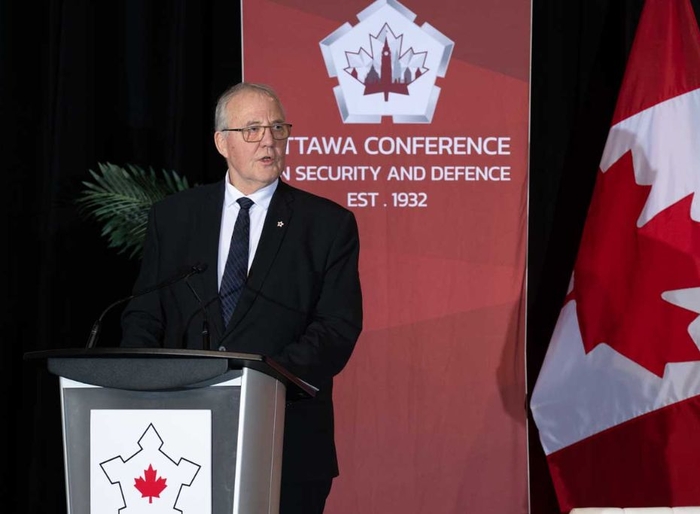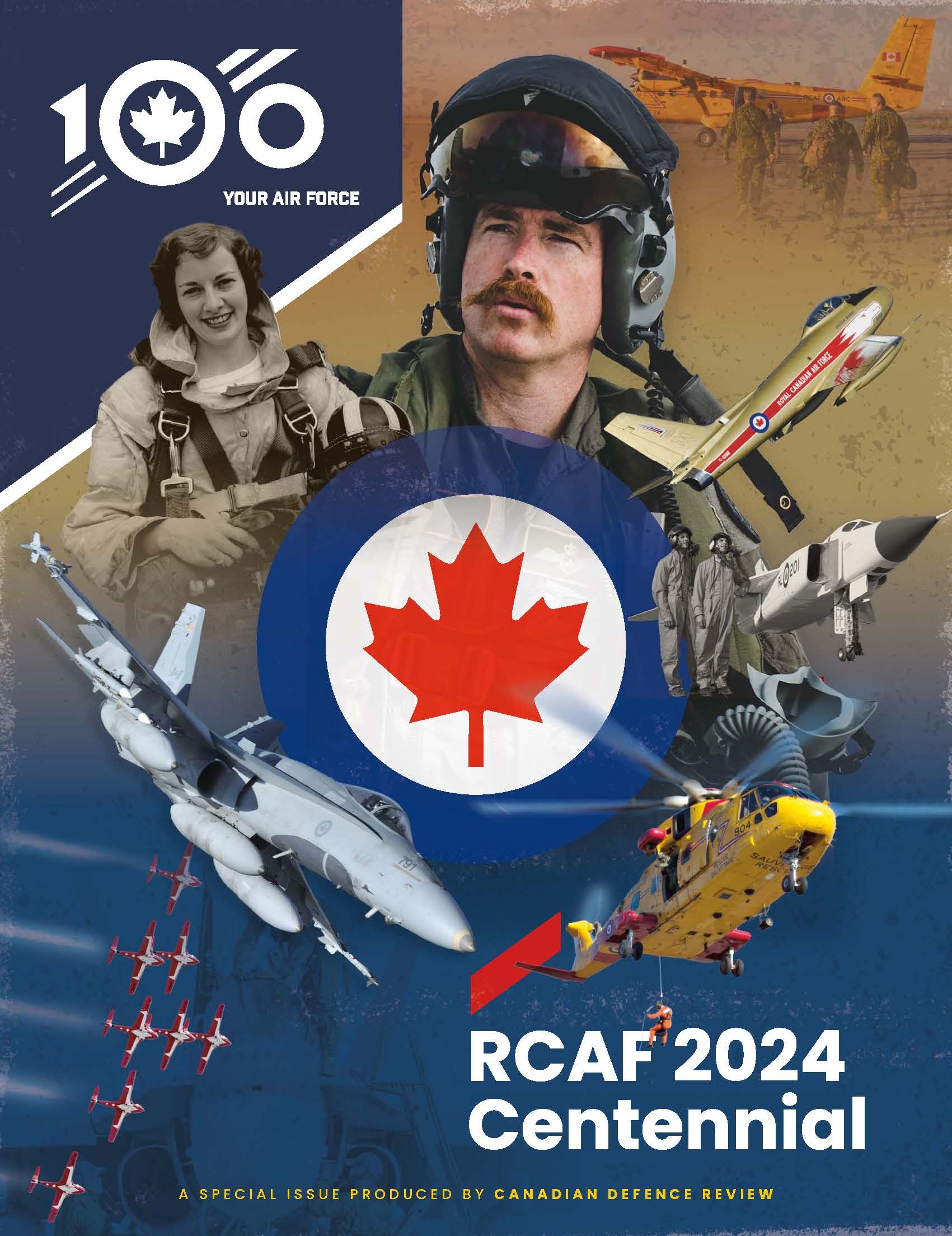Poor State of CAF Readiness Raised at CDAI Defence Conference
By James Careless
Talk about topical! A CBC News story that reported that “Only 58 per cent of the Canadian Armed Forces (CAF) would be able to respond if called upon in a crisis by NATO allies right now — and almost half of the military's equipment is considered ‘unavailable and unserviceable’” (according to an internal Department of National Defence [DND] presentation obtained by CBC News) was a prime point of discussion at the Ottawa Conference on Security and Defense. It was hosted by the Conference of Defence Associations Institute (CDAI) March 7-8, 2024, at the Fairmont Château Laurier in Ottawa. Here are some highlights from that event.
DND MINISTER TACKLES HOT TOPIC .jpg)
Keynote speaker Bill Blair, the Minister of National Defence, addressed the CAF’s poor state of readiness in his opening remarks. “As former Admiral Mark Norman stated, this is decades in the making,” said Blair. “I really see no point in us spending a lot of time trying to find out how we got to this state. We must focus on what needs to be done and we must get to work.”
Now the federal government’s much anticipated Defence Policy Update (DPU) could be the venue in which the Department of National Defence (DND) addresses the CAF’s readiness issues. Of course, this suggestion presumes that the DPU will provide more money for equipment replacement and repair, plus incentives to attract more recruits to the personnel-strapped CAF.
According to Blair, “we will soon be releasing that Defence Policy Update.” But he wouldn’t say when. “I don't have a date for you, but I understand its urgency,” Blair told the CDI audience in Ottawa and online. “I feel its urgency. We all feel its urgency. We need that clarity, we need that certainty. And so do our industry partners. So do Canadians.”
Speaking of clarity, Bill Blair acknowledged that the Canadian defence industry needs to know how much more money Ottawa is putting on the table before committing to expanded production outputs. ““We know that our updated defence policy must provide the Canadian defence industry with the certainty and clarity that it requires to meet the needs of our armed forces, because building up a more robust domestic defence industry base with a capability to scale is going to help keep Canadians safe,” he said. After all, such “resilience makes us a harder target. It makes us less susceptible to coercion. And as we provide industry with that certainty it needs, it will also be there to help our industry partners because we're in this together.”
Still, when it comes to providing the defence industry with actual money totals, Minister Blair said nothing. The best he could venture was that DND has been pleading on the CAF’s behalf to the federal government. “General Eyre and his command staff team and I have been making our case for what the Canadian Armed Forces needs, [and] what Canada needs in order to fulfill our obligations to our alliance partners and most importantly, to defend our own country,” said Blair. Unfortunately, given that the federal government has already commanded DND to cut $1 billion from its budget, one might reasonably expect these pleas to fall upon deaf ears.
LESSONS LEARNED FROM UKRAINE
War is a crucible for military strategies. It melts down existing tactical notions and recasts them into new and unexpected insights, such as the surprising effectiveness of drone warfare in Ukraine today.
The power of transformational military thinking was spotlighted during the CDAI conference panel discussion, “Adapting the Forces for the Current Fight and the Future.” The insights gained from the Ukrainian conflict were distilled into two lessons by General Gwyn Jenkins, Vice Chief of the UK’s Defence Staff. “One (lesson) is the importance of strategic, operational and tactical agility in the force,” he told the audience via a live video link from London. “Whatever fight you think you're about to get into it is probably not the fight that you end up conducting and the ability of the force to adapt under pressure and in the fight becomes really, really important. And I would observe that that was absolutely crucial in the early stages of the illegal invasion of Ukraine by the aggressive Russian forces in Ukraine's ability to resist and respond against a numerically superior force. It largely boiled down to their ability to adapt and in particular incorporate technology at pace right at the front line.”
“The second key lesson I think we've learned is one of resilience and in many ways both of these lessons are age old,” General Jenkins continued. “They've just been brought into stark relief by the atrocities that we've witnessed in Ukraine. The ability to sustain the fight once the fight starts has risen up again in our consciousness in a way that it probably has not since the end of the Cold War.”
HOW TO MAKE NATO STRONGER
NATO is more important today as a fortress of collective defense than it has been since the height of the Cold War. But as any NATO watcher knows, maintaining cooperative and mutually supportive ties between the alliance’s 32 members is an ongoing challenge. Ways to nurture these ties, plus the alliance’s strength and ability to protect its members, were explored during the CDAI’s Transatlantic Security panel discussion.
“Quite frankly, individually, we need to invest in capabilities,” advised session panelist Heidi Hulan, Assistant Deputy Minister for International Security (Political Director) at Global Affairs Canada. “Second, we need to invest in visible forms of unity. Collectively, our support to one another makes us almost unique as a community and we need to make sure that we are promoting shared values and deterring aggression in a political context … We also need to bolster our toolbox to confront new hybrid threats and by stepping up work on resilience, climate change, some of those threat multipliers. And then finally we need to work in a more determined and coordinated way with partners in Latin America, Africa and the Middle East to debunk and debunk some of the negative narratives around NATO and western partners in the world.”
LATVIA: EYRE WARNS AGAINST RUSSIAN AGGRESSION .jpg)
A calm yet stark perspective on Russian aggression in Ukraine was delivered by the Latvian Minister for Defence Andris Sprūds. In conversation with former Canadian defence minister David Pratt during an onstage ‘fireside chat’, Sprūds observed that the “existential threat” that Russian aggression poses to Europe and NATO reflects an imperialist trait embedded in its political culture — one that does not change no matter what political system happens to be in place.
“As the saying goes in Russia, ‘everything might change every 10 years, but nothing changes in 100 years,” he said. The “instinct of expansionism” in this society is thus a measurable political constant, “be it Tsarist Russia, be it Soviet Russia, (or) be it post-Soviet Russia; in this case Putin's Russia.”
Speaking after Sprūds, General Wayne Eyre — Chief of the CAF’s Defence Staff — provided a bleaker, more pointed message to the CDAI audience.
“We are two years into a war in Europe,” he said. “Putin's plan for victory is to outlast the west. So this is truly a contest of wills. Russia is mobilizing and re-arming at a much faster rate than expected. Their economy, despite sanctions, continues to grow. Ukraine, despite its incredible will to fight, is dependent on Western support. And I am worried that that support is faltering. We have not had the sense of urgency necessary to mobilize our defense industrial base, including here in Canada, which would be a clear sign that we're in it for the long haul, however long it takes, and if we don't support the democratic rights and national sovereignty of Ukrainians, if Putin is allowed to win, then the very rules and principles that keep us all safe are in grave danger.”
General Eyre then summed up the current world situation using words that echoed those of prescient commentators prior to the outbreak of World War Two.
“Ladies and gentlemen, the times we are in are most consequential, and I fear that many Canadians do not fully understand just how dangerous the world has become — that they take for granted the peace and prosperity derived from our rules-based international order,” he warned. “For Canada, our competitive advantage is being part of a group of like-minded or like-minded enough allies, partners and friends who together can collectively deter aggression, imperialism, expansionism, to remain collectively strong.” For the NATO alliance to continue to succeed in an increasingly dangerous world, “all must do their part.”







